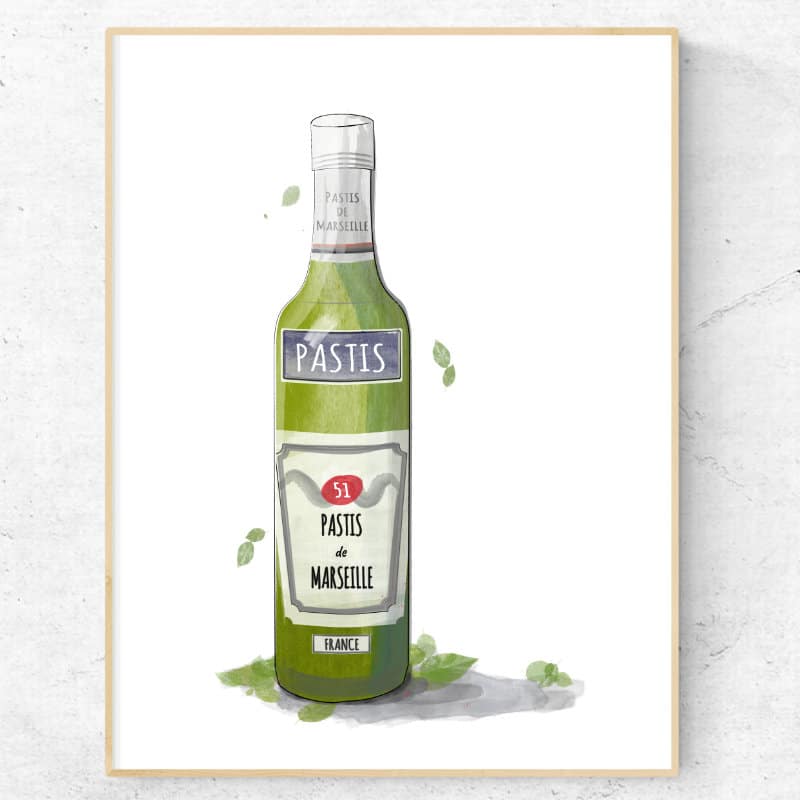Every culture has its own rules of etiquette, and the French are no different. What works in other places, may not work in France. French social etiquette has its particularities that you will want to be aware of if you are attending an apéro in France, or a dinner party.
And with France being a country famous for its wines. there are quite a few rules surrounding French wine etiquette, when to drink wine, how to drink it, and more.
As a North American who came to France as an expat and then stayed on, I was a bit caught off by some of these, in particular one that today has become very controversial, especially among the young. But I will leave the big elephant in the room for the end.
So let’s get to the basics of French wine and party etiquette, shall we? Allons-y!
- 1. Social Greetings & Bonjours
- 2. Don't bring wine to a dinner party
- 3. Wine is usually for dinner
- 4. Stick to French wines
- 5. Drink wine based on the season
- 6. Know how to buy good wine
- 7. No Beer with Dinner
- 8. Do not chill Red wine
- 9. Do not put ice in wine
- 10. Know how to open a bottle
- 11. Fill the glass till 1/2 full
- 12. Wait for the host to offer a toast
- 13. Clinking glasses and saying Cheers
- 14. Don't mix wines in your glass
- 15. Finish your wine with your meal
- 16. Women do not pour their own wine
- 17. Say Goodbye when leaving the party
1. Social Greetings & Bonjours
When you do arrive at a party or a gathering in France, it is polite to greet each person individually, with a handshake or the cheek bises if it involves a female. Yes, each person individually.
You can read more about bonjour and greeting people here.
2. Don’t bring wine to a dinner party
Unless you are going to an apéro get-together where everyone is invited to bring their own bouffe (food), there is no need to bring wine to a dinner party. In fact, it might be considered rude.
At a typical dinner party, the host will have already selected the wines to pair with each course, so your wine will be put aside and kept for another occasion.
To avoid any confusion, take a bouquet of flowers and offer to bring dessert instead.
3. Wine is usually for dinner
To start of, in France, wine and especially red wine, is usually reserved for dinner. Most French do not start drinking a glass of red wine at 6pm to start Happy Hour. We have better apéritifs for that. Start with a pastis or a kir, rather than wine.
4. Stick to French wines
If you are going to bring wine, pick a French wine. The French consider their wine the best in the world, so your bottle of Australian wine or Italian Prosecco is going to raise eyebrows.
For red wines, choose among Bordeaux, Burgundies, and Cote du Rhônes. For whites, try a wine from Alsace or sparkling wine from the Loire. And of course, you can never go wrong with Champagne.
5. Drink wine based on the season
In general, French people only drink rosés in the summer and heavy reds are reserved for winter. Food pairing and the seasons are important when choosing your wine.
For a summer delicacy, like tomates à la provençale, pick a pick a Bouches-du-Rhone rosé or Aix-en-Provence rosé. For a winter tartiflette, however, pick a white wine from Vin de Savoie or nearby Alsace. And for a wine and cheese pairing, make sure you don’t pair a heavy red with a blue cheese.
6. Know how to buy good wine
When you walk into a French grocery store, you may notice that wine in France is very very cheap. Bottle prices start at around €3. However, there are many classes of wine, and this €3 bottle of wine is probably table wine.
Learn to read French wine labels and pick a wine that is at least marked with an AOC appellation on the label.

7. No Beer with Dinner
It may or may not go without saying, but in France, dinner is usually served with wine and/or water. No pops, juices, beers, or any other beverages.
8. Do not chill Red wine
While white wines and rosés are usually served chilled, red wine should be stored in a wine cave, not in a fridge.
9. Do not put ice in wine
And along with that, there may be plenty of articles saying it is okay to put ice in wine, but if you are in France, just don’t. French people consider that it dilutes the wine and takes away the flavor. (FYI, mixing orange juice in champagne to make a mimosa is also considered sacrilegious.)
10. Know how to open a bottle
I confess I used to be guilty of being lazy and doing this. Don’t try to stick your corkscrew in over the foil. Use the sharp edge of the corkscrew to remove the foil so that you have clear access to the cork.
11. Fill the glass till 1/2 full
If you are hosting the party and pouring the wine, be aware that it should normally only be filled till it is 1/2 full, not 2/3. (Note: If you are at a restaurant, note that the waiter will only pour the wine once, not throughout the night. )

12. Wait for the host to offer a toast
Generally, guests should wait for everyone to have been served, and for the host to make a toast before sipping their wines. It is only polite, after all.
13. Clinking glasses and saying Cheers
During the toast, it is essential to look into the person’s eyes as you say Santé (meaning “to Good health”). The superstition is that it brings 7 years of bad luck to not do so.
In addition, if you are several in a group, don’t cross over other people’s arms as you are clinking glasses (with a gentle tap).
14. Don’t mix wines in your glass
If you are at a dinner party, there may be different wines served with each course. Even if both wines are red, don’t mix the two wines together if you haven’t finished the old one.
In certain cases, the host may even change wine glasses between courses to ensure there is no mixing of tastes.
15. Finish your wine with your meal
Wine that is served at dinner should usually be finished before you leave the table. After dinner, digestifs are usually served, so there is no need to continue nursing that glass of wine.
Note, french dining has its own etiquette rules, which you read more about here. (It get complicated, even cheese has its own set of rules!)
16. Women do not pour their own wine
And finally, for the controversial bit! I hesitated to write about this next item on the list of French social etiquette because it
But if you happen to be dining among the French bourgeois, even en famille, they may remark upon it, which is why I include it here.
When seated for dinner, French social etiquette dictates
The controversial part of French wine etiquette though, is that the wine should only ever be served by a man. And it gets worse: if the woman’s glass is empty, she must wait for her neighbor or the (male) host to notice and offer more. She should never ask for more wine (link in French), or God forbid, pour it herself.

☞ READ MORE: 14 French Wine Quotes for a little tipple
After much thought and discussion, I’m not sure what the point of this is, other than for the man to maintain control. Do we assume that the woman cannot control her level of drinking, so the man is “supervising”? Or is it supposed to be courteous, so that the woman doesn’t spill alcohol on her dress?
Or it assumes that the woman is serving the food so the man should remember to serve the wine? This is at home, not at a restaurant, so I suppose this could be the case. But why doesn’t the man just serve the food instead? And it doesn’t explain why the woman can’t ask for more wine.
☞ READ MORE: French Dining: History and Etiquette
I suppose a French woman of a certain generation could instruct her partner (assuming her partner is male) to keep an eye on her glass and top up when necessary. A well-placed kick under the table also works. If not, there is always complaining on the way home, so that your spouse is aware for the next occasion.
Alternatively, I think you will agree with me, that this rule can easily
17. Say Goodbye when leaving the party
When leaving the party, you do have to say goodbye to each person individually again, especially the hosts. This would involve again a handshake and the cheek bises if one of the people involved are female. You can read more about saying goodbye in French here.

And there you have it, all the French wine etiquette and social rules. Are there other rules you find objectionable?
If you enjoyed that article, you may also like to read the full French dining etiquette guide, with all its do’s and don’ts. Haven’t you always wanted to know how to eat foie gras, after all? Enjoy and à bientôt!




